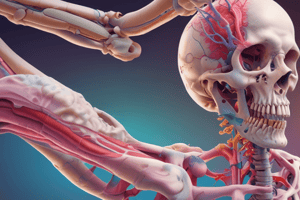Podcast
Questions and Answers
What microorganism causes Cholera and how is it primarily spread?
What microorganism causes Cholera and how is it primarily spread?
Cholera is caused by the bacterium Vibrio cholerae and is primarily spread through contaminated water or food.
List two major symptoms of Tuberculosis (TB).
List two major symptoms of Tuberculosis (TB).
Two major symptoms of Tuberculosis (TB) are persistent cough and weight loss.
How is Typhoid fever transmitted and what is a common preventative measure?
How is Typhoid fever transmitted and what is a common preventative measure?
Typhoid fever is transmitted through contaminated water or food; a common preventative measure is anti-typhoid inoculation.
What are the primary symptoms of Gastroenteritis and how is it treated?
What are the primary symptoms of Gastroenteritis and how is it treated?
What are the major differences in transmission between the Common cold and Tuberculosis (TB)?
What are the major differences in transmission between the Common cold and Tuberculosis (TB)?
Describe one method of prevention for the Common cold.
Describe one method of prevention for the Common cold.
Name the bacterium responsible for Typhoid and one of its symptoms.
Name the bacterium responsible for Typhoid and one of its symptoms.
What is the vaccination approach for Cholera and why is it important?
What is the vaccination approach for Cholera and why is it important?
Study Notes
Cholera
- Caused by bacterium Vibrio cholerae
- Spread through contaminated water or food
- Symptoms include: severe diarrhea, dehydration, vomiting, and abdominal pains
- Prevented by vaccination
Tuberculosis (TB)
- Caused by bacterium Mycobacterium tuberculosis
- Spread through droplet infection
- Symptoms include: persistent cough, fever, fatigue, weight loss, and blood in sputum
- Prevented by BCG vaccination
Typhoid
- Caused by bacterium Salmonella typhi
- Spread through contaminated water or food
- Symptoms include: high fever, acute headache, constipation, and dry cough
- Prevented by anti-typhoid inoculation
Gastroenteritis
- Caused by many viruses and bacteria
- Mainly spread through food-borne transmission
- Symptoms include: diarrhea and vomiting within hours of eating infected food
- No vaccine available; antibiotics can be taken for bacterial infections
Common Cold
- Caused by many viruses
- Spread through droplet infection
- Symptoms include: fever, headache, runny nose, sneezing, and coughing
- No vaccine available; avoid crowded places; cover nose and mouth when coughing and sneezing
Studying That Suits You
Use AI to generate personalized quizzes and flashcards to suit your learning preferences.
Related Documents
Description
Test your knowledge on common infectious diseases such as Cholera, Tuberculosis, Typhoid, Gastroenteritis, and the Common Cold. This quiz covers causes, symptoms, transmission methods, and preventive measures for each disease. Get ready to assess what you know about these important health topics.





